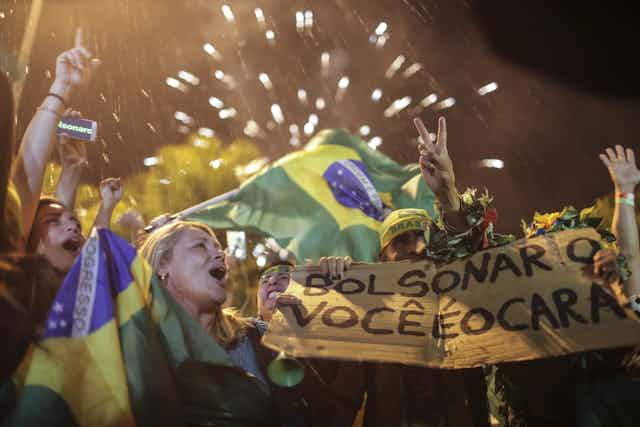Since the election of Jair Bolsonaro in October, many sectors in Brazil face great uncertainty – including the cultural sector. The next president of Brazil – who is due to take power on January 1 – has not fully disclosed his government’s plans for arts and culture, something that is filling Brazil’s film industry with a good deal of apprehension.
Brazilian cinema, so vibrant since the mid-1990s, hit its nadir in 1990 after the country’s first democratic election in 30 years brought Fernando Collor de Mello to power, intent on a rationalisation of state-supported industries. Collor abolished state control of the arts, including Embrafilme, the state film bureau. After a period marked by the hegemony of TV, Hollywood domination of the domestic market and an increase in pornographic content in national film productions, Brazilian cinema ground to a halt; no films were produced for two years.
Following Collor’s impeachment on corruption charges in 1992, Brazilian cinema began to pick up again – largely thanks to the the Audiovisual Law which was passed in 1993 and which established tax incentives for film production. The results were dramatic – production rose from 14 films in 1994 to 160 films in 2017. The resurgence in Brazilian cinema – or retomada, as it is known – saw audiences flocking to see local films, especially comedies, and market share of Brazilian films at the domestic box office went up from 5.3% in 1997 to 13.9% in 2017.
What is clear from recent decades is the close relationship between democracy and Brazil’s film industry – in particular the industry’s dependence on state support. Not long after his election, Bolsonaro announced a review of the Rouanet Law, passed in 1991 to encourage private support for the arts by providing tax incentives for private investment. This could particularly affect distribution, as most of Brazil’s most prominent film festivals – including the Mostra São Paulo – depend on the Rouanet Law for funding through that private investment.
Screening truths
The re-emergence of Brazilian cinema was emphatically underlined by films such as Central Station and the blockbuster hit City of God, both of which garnered significant international attention. Often criticised for their glossy approach to poverty and violence, films from this period were considered a rupture with previous cinematic tradition – most notably Cinema Novo, the avant-garde filmmaking of the 1960s and 1970s. The resurgent Brazilian cinema had a greater dialogue with world cinema and adopted internationally recognised genres – including, for instance, the road movie.
As in post-dictatorship Argentine cinema, the years of military dictatorship are a recurring theme in contemporary Brazilian films. Brazilian filmmakers took advantage of their newly found freedom to address and revisit the abuses of human rights that took place between 1964 and 1985. Four Days in September (1997) is based on the true story of the kidnapping of the American ambassador to Brazil during the military dictatorship. The film won an Oscar nomination for Best Foreign Language Film in 1997. Also set during the military dictatorship, The Year My Parents Went on Vacation is about a boy whose parents go into political exile. The film was nominated for a Golden Bear award at the 2007 Berlin International Film Festival.
Brazil’s National Commission of Right to Memory and Truth was important in highlighting the need to discuss issues from Brazil’s repressive political past. The commission promoted projects focusing on people who were “disappeared” during the military dictatorship. Notable among these was a multimedia project: “Antonio Benetazzo, Survival of the Senses”, which involved an exhibition, book and an essay film. The project focused on the life and work of Benetazzo, who disappeared during the military dictatorship.
A threat to democracy?
But this approach could change under Bolsonaro, who reportedly stated that Brazilians “still do not know what dictatorship is”. Many people are concerned that any curtailment of free speech under an authoritarian Bolsonaro regime could limit and shape the subject matter of films.
People are concerned, too, that Bolsonaro’s attitude to diversity – as evidenced by his numerous derogatory remarks about minorities – could affect that country’s commitment to the promotion of diversity, which has been a particularly important aspect of Brazil’s transition to democracy since the early 1990s. Relevant cultural initiatives include Vídeo nas Aldeias, a collection of more than 70 indigenous films. The Brazilian Observatory of Cinema monitors diversity in the film industry, and their reports have a particular focus on the presence – or lack thereof - of female and Afro-Brazilian filmmakers in Brazilian cinema.
Brazil’s film industry is structured around the National Cinema Agency, a state-run agency that has been responsible for regulating and to supervising the national cinema market since 2001. The agency is protected in law and private companies also scrutinise its fund management. In order to dismantle it, the government would have to take radical measures to interfere with its autonomy.
So, in the run up to Bolsonaro taking power in January 2019, it’s not so much the future of movie production that is the main concern for filmmakers, but developments in other sectors that traditionally feed into the cultural sector: free speech and the promotion of diversity. Until the new government’s agenda materialises, Brazil’s film industry needs to overcome its fear that that culture will not a priority for the incoming administration. It will be a challenge.

